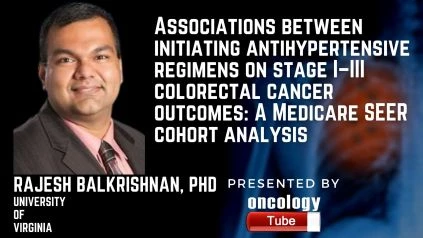Rajesh Balkrishnan, BS, MS, Ph.D., Professor Department of Public Health Sciences, University of Virginia speaks about Associations between initiating antihypertensive regimens on stage I–III colorectal cancer outcomes: A Medicare SEER cohort analysis.
Link to Article:
https://onlinelibrary.wiley.com/doi/10.1002/cam4.4088
Abstract:
Object –
Colorectal cancer (CRC) is associated with a high death rate in the United States, necessitating the investigation of new therapeutic options. Antihypertensive (AH) medicines have been shown in preclinical models to interfere with both tumor vasculature and immune cell recruitment to the tumor microenvironment. AH medicines have also been linked to better survival in various cancers, according to existing research. As a result, the goal of this study was to see how AH treatments affected CRC outcomes.
Patients and Procedures –
The Surveillance, Epidemiology, and End-Results (SEER)-Medicare database was used to conduct a non-interventional, retrospective analysis of individuals aged 65 and older with CRC diagnosed between January 1, 2007, and December 31, 2012. Cox proportional hazards models were used to investigate the impact of AH medication use on AJCC stage I–III CRC death rates in patients who had cancer therapy.
Observations –
A total of 13,982 individuals with CRC were included in the research. The use of AH medication was related to lower cancer-specific mortality among these patients (HR: 0.79, 95 percent CI: 0.75–0.83), according to the adjusted Cox proportional hazards model. ACE inhibitors (HR: 0.84, 95 percent confidence interval: 0.80–0.87), beta-blockers (HR: 0.87, 95 percent confidence interval: 0.84–0.91), and thiazide diuretics (HR: 0.83, 95 percent confidence interval: 0.80–0.87) were shown to be linked with lower mortality. Adherence to AH treatment was also linked to a lower risk of cancer-specific death (HR: 0.94, 95 percent CI: 0.90–0.98).
Final thoughts –
AH medicines may provide a potential, the low-cost avenue to supporting CRC treatment for stage I–III tumors, but further study is needed.

